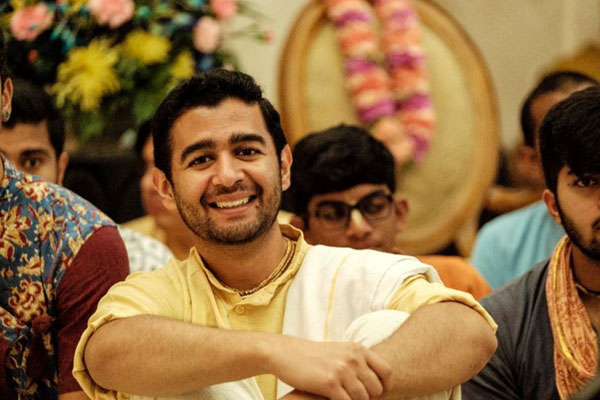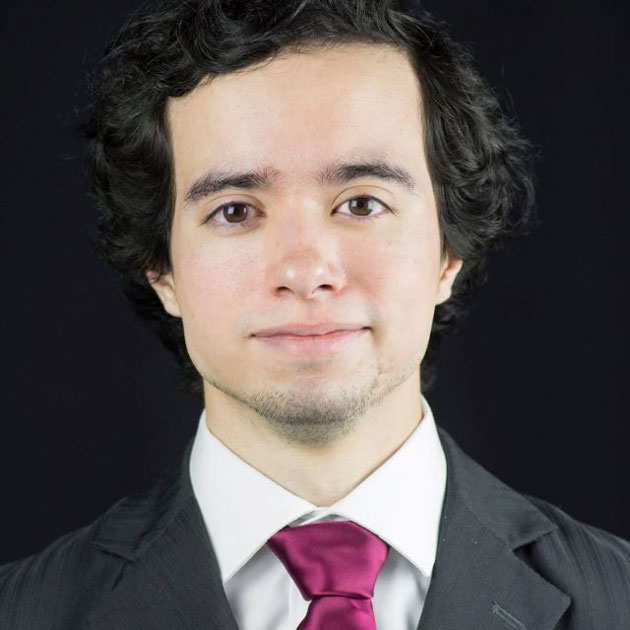
Investment Bank Risk Analyst, JP Morgan
Sethi works at JP Morgan as a specialist in counterparty credit risk calculations, doing the heavy analysis that most don’t even know exists – he investigates and explains derivative exposure variances and changes. Sethi earned both finance and actuarial science undergrad degrees. (Actuarial science is in the UT Dallas School of Natural Sciences and Mathematics.) Notably, Sethi was awarded the prestigious $15,000 Mitchell Family Foundation Scholar Award from the Texas Business Hall of Fame Foundation, based on his work with CampusOven, a service that connects university employees and students with caterers who are focused on healthy eating options. He started the company while a student at UT Dallas. “Eating healthy and sustainably is really difficult for most college students,” he said. “So this service is what I’m currently working on — and that’s why I’ve wanted to take a lot of the more entrepreneurship-focused classes.” Sethi holds the CFO role in CampusOven.
How has UT Dallas impacted your professional life?
UT Dallas provided Sethi “a way to build an educational path both qualitative and quantitative in nature. This unique path has not only helped me to strengthen technical aspects of finance, such as statistics and mathematics, but also provided a deeper perspective to my business acumen and a well-rounded thought process when dealing with larger corporate issues.”
What characteristics did you look for when building your CampusOven start-up team?
I believe, first and foremost, a great business idea is only as great as the team behind it. As I started to build CampusOven (campusoven.com), just as much as I was looking forward to serving my campus, I was beyond excited to work with my team: Rohit Shenoy (a UTD computer science student), Logan Harless BS’20 (mechanical engineering) and Benny Rubanov BS’20 (physics). We are all very focused and determined. Because of their skills and our collaboration, we have been able to solidify a catering partner, develop an intuitive web platform, create and implement operational logistics for meal deliveries and pickup, and define a uniquely tailored marketing strategy to make CampusOven’s vision a reality, all within four weeks. Without this team effort, we would not have been able to achieve such thorough and quick results.The chefs are the other side of the business. We build and maintain strong relationships with chefs who cook great meals and who are reliable. This is crucial because they are the driving force of the supply side of the business and give us a huge competitive edge against any future copycat. We sign exclusive contract agreements with chefs with the pay structure based on the number of meals they cook per week and the types of meals they cook.
What specific class or classes have helped you most with your entrepreneurial venture?
I am proud to be a UT Dallas alum. The school has amazing outlets for learning and professional development. I believe UTD students are some of the most intelligent, hardworking and driven students, and I am so fortunate to have had the chance to grow academically and professionally with them, whether it be through the Davidson Management Honors Program or the Professional Program in Finance. Some of my favorite class have been Professor Matt Polze’s business law classes. I consulted him when we were incorporating CampusOven. Professor Jack Furst’s private equity class was a huge inspiration as well, and he connected us to his private equity business colleagues who helped us refine and improve our business product.
Have any UTD alums or JSOM alums been particularly helpful or inspiring as you’ve started your venture? If so, who and how?
Before CampusOven, Rohit, our CEO, co-founded a food tech startup called Fixe Food that delivered groceries in more than 20 states, worked as a software engineer at a hedge fund and as an associate consultant at Bain & Company. Logan, our chief technology officer, is a technical consultant at Credera, a former business analyst at Capital One, and has developed our website, app and backend automation solutions. Benny, our chief marketing officer, founded a marketing organization at UTD, called Comet Marketing, before CampusOven, and is a product marketing consultant at Qorvo. His consumer marketing skills have helped tremendously boost our revenue. The four of us all met and (most are) graduated from UTD.
What is something you did while a student that you are finding particularly helpful as you launch your new company?
I cofounded a chapter of 180 Degrees Consulting (180DC.org), a university-based pro bono consulting organization, during my junior year at UT Dallas. As client outreach director, I met with nonprofits to discuss their missions, their challenges, and how 180DC could help. At the same time, I served as a project team leader with EarthX, the world’s largest environmental expo, focusing on social media strategy. Our solutions turned foot traffic (more than 160,000 attendees) into online engagement, resulting in a 400 percent increase in follower count. 180DC not only helps clients expand their impact, but also gives students management consulting experience through the promotion of social causes. Meeting the leaders working to build their communities inspired me to leverage my passion for food and drive my own social impact aspirations forward, namely CampusOven.
What advice do you have for students who think they have a great business idea?
My ambition always drives me to find an environment where learning and motivation come hand-in-hand and an environment where I can develop my abilities to pursue career opportunities and gain exposure to a strong community of seasoned professionals. I urge students to follow their passions to find themselves in a similar environment. Starting CampusOven has introduced me to the startup community, and I was so surprised and impressed with how supportive this community is in wanting to see you succeed. Coupling an environment like that with your own will to learn is the best way to make your own ideas a reality.
What leadership ideas do you lean into most at this juncture in your entrepreneurial journey?
I think one of my unique qualities is to be able to take the initiative to make something happen. Not only do I have good ideas, but I’m able to capitalize on my experiences and skillsets to be able to make my visions a reality. But when it comes to leadership, the most important thing I’ve realized is that when you have a team, it’s not just your own experiences and skillsets anymore. To lead a strong startup team, a leader must realize his or her founding team is greater than the sum of its parts. Hearing ideas, perspectives and solutions on different aspects of your business from your team members and taking an initiative to make their ideas happen is where I believe a leader can be most effective.


